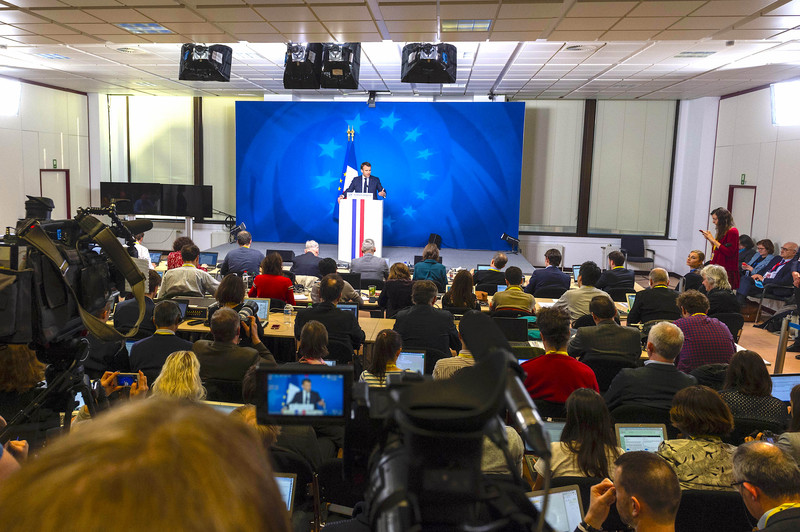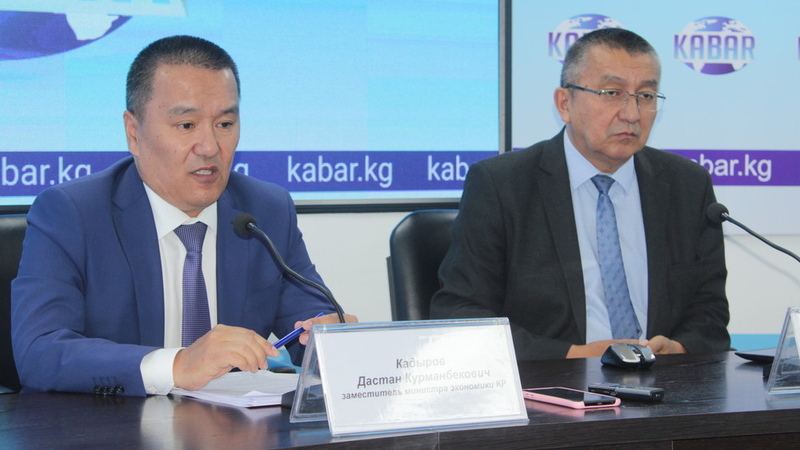
EU Observer (18 June 2019)
France has urged Iran to step back from threats on nuclear proliferation, but declined to back US claims Iran recently attacked two oil tankers.
Most EU foreign ministers meeting in Luxembourg echoed the French leader, but the UK endorsed the US accusation, which Iran denies.
French president Emmanuel Macron said on Monday (17 June) in Paris that he "regretted" Iran's threat, made earlier the same day, that it would breach a 2015 deal on nuclear arms unless Europe started buying its oil.
Iran should "respect its obligations and we strongly encourage it to adopt a patient and responsible attitude," Macron told press after meeting Ukraine's president in the French capital.
"We will do everything with our partners to dissuade Iran from this," he added.
He spoke after Iran's atomic agency said, earlier the same day, it would break the terms of the EU and UN-backed deal on 27 June by creating more near-weapons grade uranium than the accord allowed.
It issued the threat after the US walked away from the pact, reimposed sanctions on Iran, and forced EU companies to stop doing business there.
"The current situation is very critical and France and the other parties to the [deal] still have a very limited opportunity to play their historic role for saving the deal," Iranian president Hassan Rouhani said on Monday while meeting the new French ambassador to Tehran.
The US has also accused Iran of sabotaging two oil tankers in the Persian Gulf in recent days and warned of military reprisals.
But when asked if France believed the US accusation, Macron said only the situation required "cool heads" and warned against "escalation".
The EU foreign affairs chief, Federica Mogherini, took a similar approach to the unfolding crisis.
She said Iran's threat was merely a form of "political dialectics" and that the EU would only react once the International Atomic Energy Agency in Geneva, a UN-body, had confirmed whether Iran was still in compliance with the 2015 accord or not.
"So far, Iran has been compliant with its nuclear commitment as we had expected it to be," she said after a meeting of EU foreign and defence ministers in Luxembourg.
She declined to comment on the US tanker claims, saying only that she feared "miscalculation" and "unintentional escalation".
Heiko Maas, the German foreign minister, said: "It is up to Iran to stick to its obligations ... We will certainly not accept a unilateral reduction of obligations".
But he sounded a sceptical note on the US tanker claim, adding that all the information had "come from one side in particular [the US]".
Maas, as well as his Czech, Dutch, Finnish, Latvian, Luxembourgish, and Romanian counterparts said the EU needed more information before assigning blame.
"I think it's a very, very concerning event but let's have all the details first," Finnish foreign minister Pekka Haavisto said.
Harriet Baldwin, the British defence minister, said the UK was "almost certain that this was Iranian action".
Urmas Reinsalu, Estonia's foreign minister, also said he was "taking very seriously the statements made by the US".
But Luxembourg's Jean Asselborn recalled the Iraq wars of 2001 and 2003, when the US and UK claimed wrongly that Iraq was building weapons of mass destruction.
"I'm convinced, as I was 16 years ago, that you really shouldn't make the mistake of believing that you can solve a problem in the Middle East with weapons," he said.
Stef Blok, the Dutch foreign minister, also said that even if Iran did attack the two oil tankers, it ought to make no difference to EU efforts to save the nuclear arms pact.
"The nuclear deal should be judged on the content of the deal itself ... so long as Iran is fulfilling the criteria, the EU should stick to the deal," he said.
Meanwhile on Monday, the Pentagon announced it would send 1,000 additional US forces, and other military resources, to the Middle East.
The US will send 1,000 additional US forces and more military resources to the Middle East amid tensions with Iran, the Pentagon announced Monday.
Defence secretary Patrick Shanahan said the forces would serve "defensive purposes to address air, naval, and ground-based threats in the Middle East."
No comments yet.
- JAPAN REJECTS KOREAN FUND PLAN TO COMPENSATE FORCED WARTIME LABOUR Asia - Pacific 19.06.2019
- KYRGYZSTAN: COMMISSION BRINGS CORRUPTION CHARGES AGAINST EX-PRESIDENT ATAMBAYEV Central Asia 19.06.2019
-
 KYRGYZSTAN, TURKMENISTAN SIGN AGREEMENT ON AVOIDANCE OF DOUBLE TAXATION
Central Asia
19.06.2019
KYRGYZSTAN, TURKMENISTAN SIGN AGREEMENT ON AVOIDANCE OF DOUBLE TAXATION
Central Asia
19.06.2019
- ARMENIAN PRESIDENT PAYS WORKING VISIT TO FRANCE The Caucasus and Turkish-Armenian Relations 19.06.2019
- ONLY EIGHT EU COUNTRIES PLAN TO PHASE OUT COAL BY 2030 Europe - EU 19.06.2019
-
25.01.2016
THE ARMENIAN QUESTION - BASIC KNOWLEDGE AND DOCUMENTATION -
12.06.2024
THE TRUTH WILL OUT -
27.03.2023
RADİKAL ERMENİ UNSURLARCA GERÇEKLEŞTİRİLEN MEZALİMLER VE VANDALİZM -
17.03.2023
PATRIOTISM PERVERTED -
23.02.2023
MEN ARE LIKE THAT -
03.02.2023
BAKÜ-TİFLİS-CEYHAN BORU HATTININ YAŞANAN TARİHİ -
16.12.2022
INTERNATIONAL SCHOLARS ON THE EVENTS OF 1915 -
07.12.2022
FAKE PHOTOS AND THE ARMENIAN PROPAGANDA -
07.12.2022
ERMENİ PROPAGANDASI VE SAHTE RESİMLER -
01.01.2022
A Letter From Japan - Strategically Mum: The Silence of the Armenians -
01.01.2022
Japonya'dan Bir Mektup - Stratejik Suskunluk: Ermenilerin Sessizliği -
03.06.2020
Anastas Mikoyan: Confessions of an Armenian Bolshevik -
08.04.2020
Sovyet Sonrası Ukrayna’da Devlet, Toplum ve Siyaset - Değişen Dinamikler, Dönüşen Kimlikler -
12.06.2018
Ermeni Sorunuyla İlgili İngiliz Belgeleri (1912-1923) - British Documents on Armenian Question (1912-1923) -
02.12.2016
Turkish-Russian Academics: A Historical Study on the Caucasus -
01.07.2016
Gürcistan'daki Müslüman Topluluklar: Azınlık Hakları, Kimlik, Siyaset -
10.03.2016
Armenian Diaspora: Diaspora, State and the Imagination of the Republic of Armenia -
24.01.2016
ERMENİ SORUNU - TEMEL BİLGİ VE BELGELER (2. BASKI)
-
AVİM Conference Hall 24.01.2023
CONFERENCE TITLED “HUNGARY’S PERSPECTIVES ON THE TURKIC WORLD"









